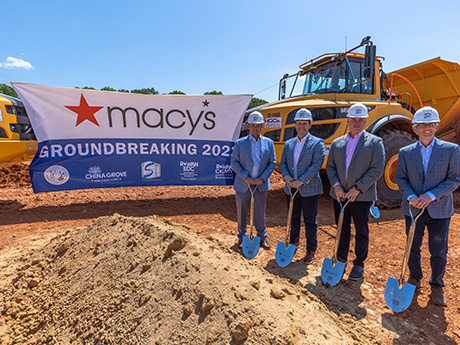In a constantly evolving and unprecedented era, Charlotte is an extremely well-positioned industrial market experiencing significant rent growth, an influx of new capital and development in new frontiers. As of first-quarter 2022, Charlotte was nearing an all-time low vacancy rate and rental rate growth reached more than 12 percent year-over-year. Needless to say, Charlotte has become a prime target for industrial investors, developers and tenants.
Staggeringly low vacancy, strong tenant demand and rapid rent growth are trends the industrial real estate sector is experiencing around the county. While these trends are not necessarily unique to Charlotte, they are having a particularly large impact on how Charlotte is growing.
These strong underlying leasing fundamentals accompanied by land scarcity left Charlotte under-supplied with developers on the hunt for land.
A recent announcement by the Silverman Group is a great example. After closing on a 200-acre site just 30 minutes northeast of Charlotte in Rowan County, the Silverman Group announced a speculative industrial development capable of up to 1.9 million square feet and quickly signed a lease with Macy’s for an e-commerce distribution center spanning 1.4 million square feet.
On the west side of Charlotte in Gaston County, NorthPoint Development has seen similar success with the acquisition of a 300-acre site and subsequent leases with Newell Brands for 1.5 million square feet, Amazon for 286,000 square feet and a pending lease for 620,000 square feet.
Around the same time, The Keith Corp. announced a speculative development in Gaston County capable of 1.3 million square feet that is currently under construction. Both Gaston and Rowan counties, considered new frontiers for Charlotte, are seeing an explosion of speculative development following recent success stories. As of today, developer-controlled land positions in the two counties amount to over 15 million square feet of new industrial development potential.
Charlotte has long been recognized nationally by investors as a desirable market for capital placement. However, in the past 24 months Charlotte has become even more attractive as we are seeing new capital entering the market and record-breaking transactions with investors fighting for a position.
Industrial investment sales volume in Charlotte grew significantly in 2021 totaling $1.8 billion, a 46 percent increase over the previous five-year average. Starting in 2021, the “forward sale” concept took off as developers and investors come to purchase agreements and lock in pricing for properties under construction.
As such, over 2.8 million square feet hit the market from developers such as Scannell Properties, Strategic Capital Partners, Trinity Capital and Collett Industrial and Selwyn Property Group. Strong preleasing fundamentals and limited investment opportunities laid the groundwork for highly successful forward sale marketing campaigns.
While Charlotte’s sprawling growth pushes tenants further and further from city center, the value of the infill site has never been more apparent. Charlotte’s legacy industrial submarkets are now home to adaptive reuse developments where apartments, breweries and retail concepts are pricing industrial users out of the area.
One major impact has been the diminishing supply of heavy industrial-zoned land dubbed Industrial Outdoor Storage. Tenants in need of laydown yards and trailer parking are having difficulty finding secured storage sites intown that are needed for their operations.
To further complicate matters, investors with a focus on Industrial Outdoor Storage sites have entered the market in an aggressive way, causing land prices to double and in some cases triple overnight. High land prices have been accompanied by high lease rates, as well as extremely low inventory.
As we approach the end of the second quarter and head in to the second half of 2022, several things stand out. Preleasing activity remains strong, vacancy sits at historical lows and investor sentiment remains positive.
Additional interest rate hikes from the Federal Reserve appear imminent, and while nationally there have been impacts on pricing, Charlotte’s underlying fundamentals and rent growth story have supported upward momentum.
The overall outlook for Charlotte’s industrial market shows it will remain a strategic East Coast location for investors, developers and tenants.
This article was originally published in the June 2022 issue of Southeast Real Estate Business.



